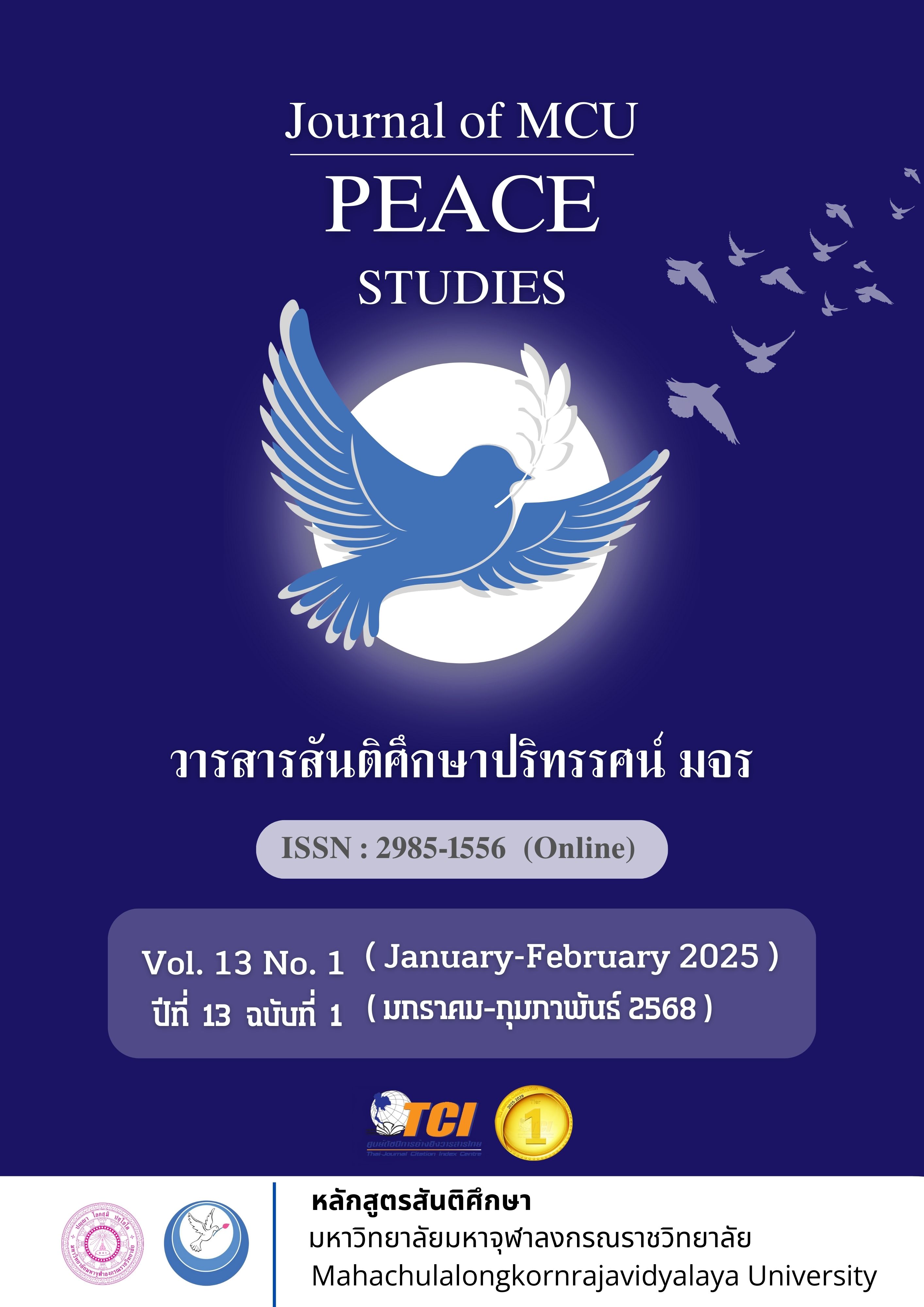The Organizational Commitment Development by Buddhist Peaceful Means: A Case Study of the International Buddhist Studies College, MahachulalongKornrajavidyalaya University
Main Article Content
Abstract
The objectives of this research are as follows; 1. To study and analyze the problems, context, needs, and modern theoretical concepts related to the development of organizational commitment; 2. To study and analyze Buddhist peaceful means that contribute to the development of organizational commitment, with a specific focus on the International Buddhist Studies College (IBSC); and 3. To develop and present a model for the development of organizational commitment by Buddhist peaceful means, using the case of the IBSC at Mahachulalongkornrajavidyalaya University. This research was conducted based on the framework of the Noble Truth Model using the 9-step ladder approach of the Peace Studies Program of the Graduate School, Mahachulalongkornrajavidyalaya University.
The research results were found that: 1. Overall Problems within the International Buddhist Studies College (IBSC) and the overall issues among IBSC personnel include: The issues identified include: 1) complex and unclear management processes, 2) lack of knowledge on guiding personnel in self-development in various aspects, 3) insufficient knowledge on developing roles and processes to build commitment, and 4) lack of techniques for fostering behavior in line with organizational values. 2. Buddhist Peaceful Means for Enhancing Organizational Commitment: The study identifies the Threefold Training (Trisikkhā) as the key Buddhist principles to enhance organizational commitment through the cultivation of morality (sīla), concentration (samādhi), and wisdom (paññā). The analysis involves understanding the true needs of personnel in the organization through the Four Noble Truths, The evaluation of organizational commitment is conducted through the Four Developments (Bhāvanā) 3. Steps for Developing Organizational Commitment by Buddhist Peaceful Means: The case study of the IBSC at Mahachulalongkornrajavidyalaya University presents a new model known as the AEIOU Model, which includes five steps: 1) Awareness, 2) Environment, 3) Inspiration, 4) Organization System, and 5) Understanding. The development focuses on three key areas: 1) raising awareness among personnel on various aspects, with detailed actions for each step (Awareness), 2) encouraging personnel to be committed to achieving success in their responsibilities and contributing to the organization's progress (Ignite), and 3) emphasizing practical action, fostering creativity and initiative, and solving problems independently through experimentation. This creates a safe learning space and drives the success of every activity (Action).
Article Details

This work is licensed under a Creative Commons Attribution-NonCommercial-NoDerivatives 4.0 International License.
Views and opinions expressed in the articles published by The Journal of MCU Peace Studies, are of responsibility by such authors but not the editors and do not necessarily reflect those of the editors.
References
Anuwat-Udom, M. (2013). Basic Knowledge Framework on Conflict Management through Peaceful Means: Peace Dialogue. Bangkok: Office Peace and Governance, King Prajadhipok's Institute.
Aphiprachayasakul, K. (2017). Organization Efficiency Increasing. Bangkok: Focus Media and Publishing.
Katim, L., Wongnaya, S., & Boonpituk, S. (2018). Strategic Movement for Human Resource Management of Phobphrawittayakom School under the Secondary Educational Service Area Office 38. Srinakharinwirot Academic Journal of Educational, 19(1), 174-192.
Manmee, Th. (2014). Building Organizational Commitment in Buddhism. Retrieved May 5, 2023, from https://www.gotoknow.org/posts/582130
Phra Pramote Vatagovito et al. (2020). The Development of Curriculum for Enhancing the Local Leader Competencies in Becoming Peace Engineer for Building Peace in the Communities. (Research Report). Phra Nakhon Sri Ayutthaya: Mahachulalongkornrajavidyalaya University.
Phramaha Hansa Dhammahaso (Nithibunyakorn). (2014). Buddhist Conflict Resolution: Integrating Principles and Tools for Conflict Management. Bangkok: Mahachulalongkornrajavidyalaya University Press.
Premwichai, P. (2023). Three Studies for Human Resource Development. Journal of Interdisciplinary Innovation Review, 6(1), A34-A41.
Rojanamongkol, P. (2018). The Effect of Leadership to Engagement of the Employees in Generation-Y: Case Study of the Company A. (Master’s Thesis). Rajamangala University of Technology Krungthep. Bangkok.
Smithikrai, Ch., & Phusapanit, P. (2017). Factors Influencing Job Commitment and Organizational Commitment of Personnel at Chiang Mai University. Chiang Mai: Chiang Mai University.
Watthanatsap, W. (2012). Conflict: Principles and Problem-Solving Tools. (4th ed.). Khon Kaen: Khlangnana Wittaya Printing House.


